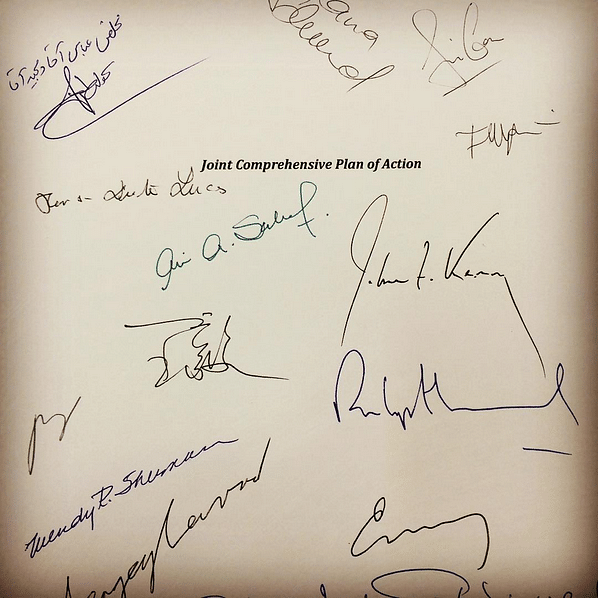The US President is dragging his heels on certifying Iran’s compliance to the JCPOA, which could put the landmark plan in a tinder box.
US President Donald Trump, on 13 October, conveyed his reluctance to certify the Iran’s compliance to the Joint Comprehensive Plan of Action (JCPOA) signed between the P5+1 and Iran.
Following on from this, the US Congress may either decide to reimpose sanctions on Iran, or consider a temporary restraint.
In either case, the confidence of the international community to work collectively to preserve world peace and coerce belligerent regimes through politico-diplomatic means would receive a serious setback.
What is JCPOA?
The JCPOA limits Iran’s uranium enrichment programme on a quantifiable and verifiable basis, based on an Iranian nuclear development and research plan submitted to the IAEA as part of Tehran’s initial declaration in its additional protocol.
As per the agreement, Iran would only use 5,060 IR-1 centrifuges to enrich uranium for a period of 10 years. It would not be permitted to enrich more than 3.67 per cent (Uranium-235) for at least 15 years, and that too, only at the Natanz commercial facility.
During this period, Iran would not have a stockpile of more than 300 kilograms of low-enriched Uranium). Adhering the above mandate, Iran shipped out additional LEU on 28 December 2015 to Russia.
As on date, the International Atomic Energy Agency (IAEA) has fully certified all technical compliance by Iran to its board of governors, who in turn, have reported to the United Nations Security Council (UNSC).
Timeline of activities
UN Resolution 2231 (on the nuclear programme of Iran and JCPOA) was finalised on 14 July 2015, and came into effect after 90 days of endorsement. This period was introduced to address US concerns that it required a suitable time frame for review by the Congress or any other legislature of Iran or other P5+1 countries (the five permanent members of the UN Security Council plus Germany).
On ‘adoption day’ (18 October 2015), the US issued the provisional presidential waivers required to implement US sanctions relief, with the waivers to formally take effect on ‘implementation day’ (the day the IAEA physically verified the reduction of centrifuges and removal of the core of Iran’s Arak reactor).
Eight years from ‘adoption day’, that is on 18 October 2023, based upon the “broader conclusions” report from the IAEA Director General to the UNSC, the US was required to remove ‘specified’ Iranian entities subjected to sanctions. The US administration would also be required to seek a legislative termination of sanctions that were suspended on ‘implementation day’.
Consequences of Trump’s reluctance
Existing US sanctions such as the Iranian Sanctions Act, the Iranian Threat Reduction and Syrian Human Rights Act, the Iran Freedom and Counter Proliferation Act, and a few others need presidential authority to waive off sanctions.
Non-certification by the US President is unlikely to abrogate the JCPOA. Instead, it puts the whole mechanism in a tinder box, with a very high potential to reignite the hostilities between Iran and the US, and shifting the local Syrian conflict to a larger Middle-East confrontation. Critics’ concerns are not only based on JCPOA’s expiration period (10-15 years), but on the intention and behaviour of the Iranian regime.
Despite prolonged sanctions, Iran has remained steadfast in pursuing an ambitious missile programme, and has been supporting the Shia rebels in Yemen, Syria, Lebanon, Saudi Arabia, and Iraq.
The Trump administration needs to be reminded that the US’s four-decade-old anti-Iran policy has helped the Islamic Republic to only consolidate its domestic legitimacy, strengthen strategic relationships with Russia, enhance its economic partnership with China and the EU, and provide adequate space to manoeuvre in asymmetric warfare in the Middle-East.
Escalating the stand-off to a military confrontation will destabilise the Middle-East, and give fresh impetus to the likes of Al-Qaeda, ISIS, and the Taliban. It will also severely impede its new strategy to normalise Afghanistan, and its recently-enunciated strategy on Pakistan.
Moreover, by sidelining the UNSC-supported JCPOA, it would be a monumental task to form coalitions to challenge Iran’s military and sub-conventional threat in the future.
What the US must do
Despite all the perceived limitations of the JCPOA and the US belief that it doesn’t address its security concerns, as enunciated by former National Security Advisor Michael Flynn, the US strategy around Iran must focus on tackling the asymmetric challenges presented by Iran’s destabilising policies in the region.
The US could consider taking India into confidence, keeping in view the latter’s newfound friendship/alliance with Israel, Saudi Arabia, Qatar, and its influence in Afghanistan.
Iran’s imperial past, with its roots in national self-identity and its cultural pluralism, has consistently followed a policy of exerting political and economic influence over its neighbours and extended neighbours. Post de-certification strategy must amalgamate the above aspect in its national security concerns, and permit the spirit of the JCPOA to adhere to its first laid down timeline of October 2023, in close consultation with the US’s EU partners.
In any case, the JCPOA contains a mechanism for “snap back” on UN sanctions due to Iranian non-compliance within 65 days of a complaint.
(The author is a retired Brigadier of the Indian Army, and was India’s Defence Advisor in Iran. He has dealt extensively with the progress of Iran’s nuclear programme.)



